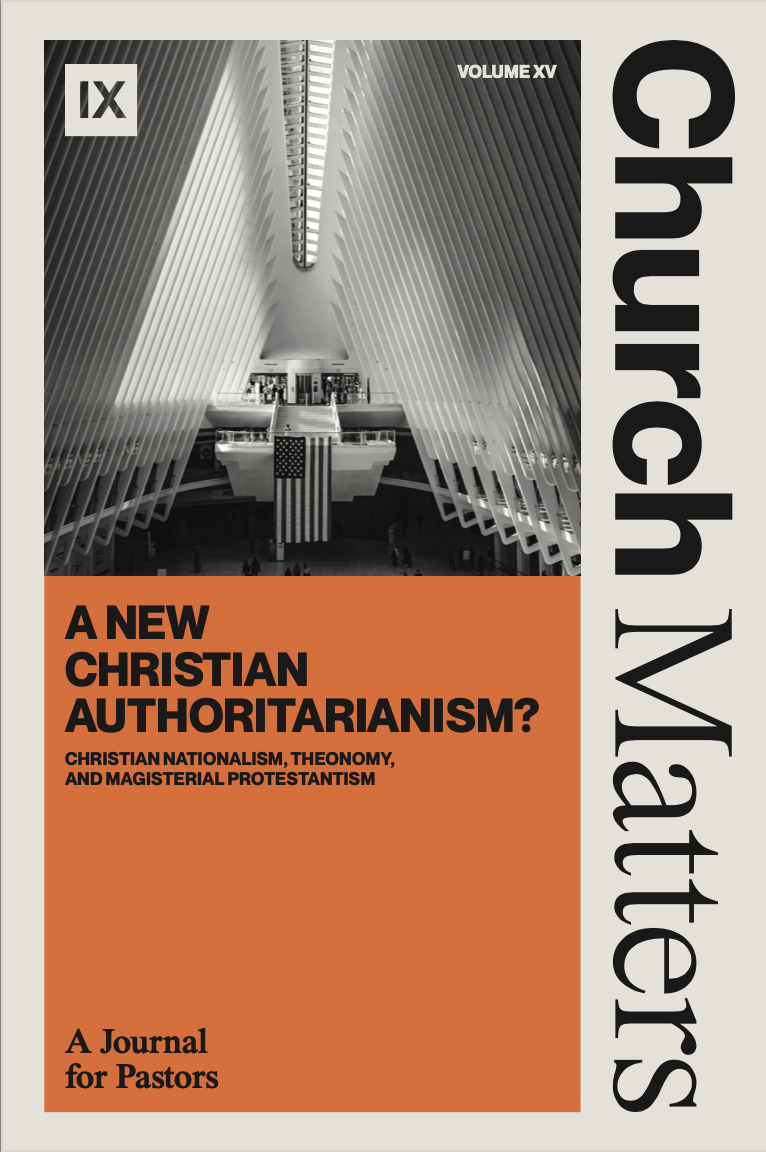A Guide to the Journal
Since it’s unusually long, we thought a more careful guide to the Journal might help.
Jonathan Leeman kicks off this issue by sketching out and critiquing the basic premises of what we’re calling Christian Authoritarianism. Building off this evaluation, Leeman moves on to consider the nature and extent of the government’s authority according to the Bible. With these two articles in hand, Leeman provides several reasons why one should ultimately reject Christian Nationalism.
Our next batch of articles aims to present the lay of the land concerning the theonomic conversations happening in our day. Tom Hicks leads this effort by identifying four key features of General Equity Theonomy. Joseph Thigpen follows by trying to show what daylight exists between old-school Reconstruction theonomists and new-school General Equity theonomists. Lastly, John Wilsey argues for religion’s place in the public square by sketching out Christian Nationalism’s history and impact on the United States since its inception.
Next up is a series of articles bringing critique against some of the theological constructs of theonomy and Christian nationalism. Batting first is Albert Mohler, who argues that theonomy is not only anti-conversionist and anti-Baptist but also contradicts the Westminster Confession and is, therefore, anti-Presbyterian. Second in this lineup is David VanDrunen, who shows us what characteristics and responsibilities God gives to all civil governments not named Israel through the Noahic Covenant. Next up is Matthew Emerson’s take on Christian Nationalism from a credobaptist perspective and what a positive Baptist political theology looks like. David Schrock then joins the batting order, where he argues that postmillennialism’s optimism for renovated nations before the return of Christ is faulty and futile. Because so much of this conversation centers on the Mosaic law, Jason DeRouchie rounds out the inning with helpful hermeneutical tools for Old Testament passage-making.
Like recognizing that Route 66 is only one of many ways west, our next group of articles drive competing covenantal perspectives to the same endpoint concerning theonomy—it simply doesn’t work. These articles feature Ligon Duncan, who hails from the land of Westminster Presbyterians; Justin Perdue, from the company of 1689 Baptists; and Joshua Greever and Jason DeRouchie, who travel in from the new world of Progressive Covenantalism. Together they demonstrate how one version or other of covenant theology works as a bulwark against theonomy.
Our next section trades in history and logic as much as theology in order to combat theonomy and Christian Nationalism. Matthew Bennett leads off this effort by helpfully showing three similarities between theonomy and Islam’s sharia law and how theonomy undermines the Church’s mission. Following Bennett, Michael Horton employs history, biblical theology, and practical wisdom to argue against seeing culture war and Christian mission as coterminous ideas. Nathan Finn plays a similar historical note as Michael, only from a Baptist perspective, to show that state-endorsed religion is antithetical to Baptist ecclesiology. Next, John Wilsey warns that the Christian Nationalism of the Moral Majority and Stephen Wolfe’s Christian Nationalism wrongfully rely on nostalgia instead of Christian and classical virtues like faith, hope, temperance, and justice. Next, Matthew Arbo argues that Christian Nationalism is intrinsically utopian because it imports into this life features of the next and secures them by temporal means. Ian Clary follows Arbo to examine 18th-century Baptist John Gill’s understanding of natural law in order to show where theonomy is out of step with the Reformed and Baptist traditions. Matt Martens joins these authors’ ranks, where he shows how a muscular government the likes of Magisterial Protestant formulation is beyond the biblical and practical pale and should, therefore, be rejected. Finally, Dustin Asbury looks at the life and legacy of Charlemagne to argue for Christian reliance on the ordinary means of grace as opposed to political violence.
Our next company of articles means to encourage you, pastor, as you face the troubled waters created by the winds of theonomy and the like. John Piper is first across the line with his admonition for preachers to aim their sermons at helping Christians prepare for suffering in this life and glory in the next, not the other way around. Next, Kevin DeYoung places church and state relations and the liberty of the individual conscience in the larger economy of a biblically faithful political theology. Following DeYoung, Jeremy Walker helps us orient our loves and priorities by comparing compromise in the church and nation. In a similar key, Jamie Southcombe follows Walker to emphasize the priority of unity amongst Christians over and above unity with our countrymen. Jeff Weisner joins the mix to help us think through how pastors can practically reinforce their people’s understanding of Covenant Theology as a defense against theonomy and co. On the practical front, Ken Barbic poses ten diagnostic questions to help us think through the ordering of our allegiances and the impact this has on our following Jesus. Next up is politician-turned-pastor Dave Brown, who shares a few lessons he learned about idolatry whilst trading political punches on the Hill and working alongside the Moral Majority for President Regan. Next, we asked a few international pastors whether they were thumbs up or down on culture war as part and parcel of the church’s mission. Their answers are especially helpful to those of us living in the US. Lastly, we collected several transcribed prayers prayed in public civic settings by faithful pastors. We hope these encourage you to remember your leaders and teach your people to pray for them regularly.
Lastly, we solicited a number of book reviews on books central to this conversation. We hope these reviews will prove helpful to you as you consider the merit of the arguments being made.








